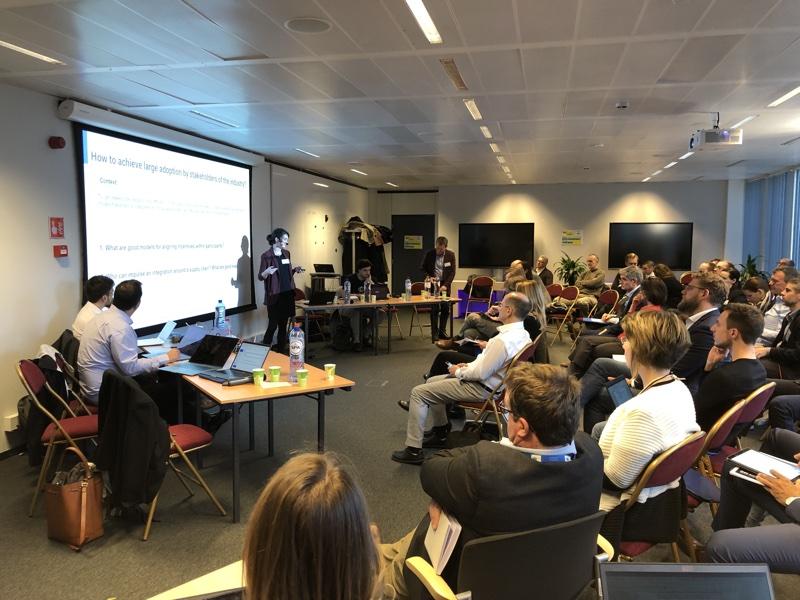
What happened at the European Union Blockchain Observatory & Forum workshop on supply chain in Brussels on 19 February, 2019
Tracking, tracing and supply chain has long been one of the most promising and talked about use cases for blockchains.
This is hardly surprising: Today’s global supply chains tend to feature a great number of stakeholders spread out over many different jurisdictions. They involve the exchange of large amounts of data between parties with low levels of trust, and are prone to fraud and counterfeiting. They also can be slow and expensive, with outdated, often paper-based processes.
As a technology designed to allow for the exchange of trusted information among heterogeneous groups without third parties, blockchain would seem a natural fit for such an environment.
At the seventh workshop of the EU Observatory & Forum, held on 19 February, 2019 in Brussels, 65 participants, including 11 speakers, gathered to take a close look at the benefits of and hurdles facing blockchain in supply chains, as well as what Europe can do to foster the uptake of blockchain for supply chain in the region.
Below we present a summary of the day’s discussion.
Benefits
There was little doubt among participants that blockchain offers many benefits for supply chain stakeholders. The primary ones include reducing costs, adding efficiencies, increasing transparency, elevating the level of trust in supply-chain related data, and fighting counterfeiting and fraud.
There are other benefits as well. Consumers increasingly want transparency on the provenance and quality of the products they buy. By providing product-level trusted data, blockchain can help manufacturers and retailers meet this new market demand. Reducing friction and adding transparency to global supply chains could also have economic benefits, with the WTO recently estimating a potential $1 trillion benefit to global trade (finance and logistics) through blockchain technology.
All of this provides strong incentives for almost all the actors involved – whether suppliers, transport companies, manufacturers or public bodies like customs and excise – to invest time and money into developing blockchain-based supply chain platforms. As one speaker pointed out, the only stakeholders that don’t stand to benefit from this technology are criminals and counterfeiters, whose business models could be heavily impacted through increased transparency and auditability provided by blockchain.
Hurdles
There are hurdles as well. For honest actors, the transparency and auditability provided by blockchains threatens to expose business-relevant data and so provide a competitive disadvantage. Being able to ensure proper data access and obfuscation will therefore, participants said, be one important key to adoption.
Ensuring data integrity will be another. Although data on a blockchain is resistant to corruption, if the data is no good to begin with, then blockchain brings little benefit. A promising way to address this problem – and one where a lot of work is being done at the moment – is to use sensors attached to secure gateways to monitor products and materials as they travel along the chain. As one expert said, this could help dramatically improve data quality, though it will likely never be possible to ensure 100% integrity.
To be effective, global blockchain-based supply chain platforms will clearly need to scale. This is less of a problem for permissioned than for permissionless blockchains, though the technology is still young and we can expect highly scalable blockchain solutions of all types in the near to mid-term future.
Another major hurdle to adoption of blockchain in supply chains, participants said, is not technological but psychological. Many players, particularly smaller ones, do not necessarily see the benefits and are not motivated to change their processes. This will need to be addressed through education about the benefits of the technology and important consumer macro trends, like increasing demand for transparency, driving the need for change.
Role of government and private sector
Government can help address some of these problems. Participants felt that standards – especially those that are recognised by authorities across borders – will be important to foster blockchain-based supply chains. Governments can also foster adoption through supporting research and education and generally helping to impulse large projects.
The private sector has a role in driving adoption too. We are already seeing different models emerge. For example, a single major player that builds a platform for its own supply chain and then open sources it, or a consortia run by a trusted neutral entity develops a common platform for its members.
Adoption could similarly be supported by a series of EU-funded projects that bring together ecosystems and create a practical use case whereby port authorities, customs officials and other agencies can be hands-on involved in signing blockchain transactions.
Participants all agreed that more legal clarity in terms of blockchain (legal framework, smart contracts, liability) would be important too, as would EU-wide initiatives that make it easier for startups to collaborate across borders.
Details
- Publication date
- 28 February 2019
